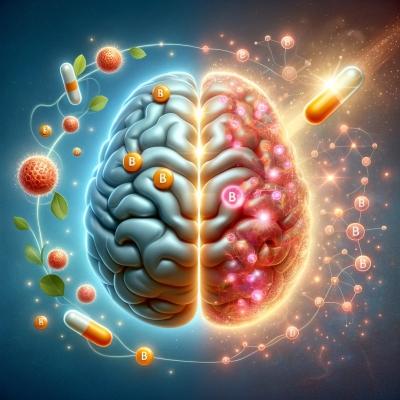
Introduction to B Vitamins
B vitamins are a group of water-soluble vitamins that play vital roles in cell metabolism and brain health. They are essential nutrients that must be obtained from the diet. B vitamins, including B12 (cobalamin), B9 (folic acid), and B6 (pyridoxine), have been particularly identified for their impact on cognitive function and their potential to slow the progression of Alzheimer's disease, a condition characterized by brain atrophy and cognitive decline.
The Link Between B Vitamins and Alzheimer's
Alzheimer's disease is a progressive neurological disorder that leads to the destruction of memory and other important mental functions. Research has shown a link between high levels of the amino acid homocysteine in the blood and the development of Alzheimer's disease. B vitamins have been found to lower homocysteine levels, which can reduce the risk of brain atrophy and cognitive decline.
Key B Vitamins Involved
Vitamin B12, B9, and B6 are particularly important for cognitive health. B12 is essential for nerve tissue health, brain function, and the production of red blood cells. Folic acid plays a key role in mental and emotional health by helping to produce DNA and RNA, the building blocks of cells, including brain cells. Vitamin B6 is required for neurotransmitter synthesis, which affects mood and brain functions.
Mechanisms of Action
B vitamins contribute to brain health through several mechanisms. They help reduce homocysteine levels, which is linked to a decreased risk of brain atrophy. They also support the metabolism of the brain and maintain the integrity of the myelin sheath, the protective covering of neurons, which is vital for the rapid transmission of signals in the brain.
Clinical Evidence
Numerous studies have supported the beneficial effects of B vitamins on brain health. For example, a pivotal study found that high doses of B vitamins significantly slowed the rate of brain atrophy in patients with mild cognitive impairment, a precursor to Alzheimer's disease.
B Vitamins Supplementation
While B vitamins are available through diet, supplementation may be necessary for individuals at risk of deficiency, especially the elderly and those with dietary restrictions. It's important to follow recommended daily allowances and consult healthcare professionals when considering supplementation.
Safety and Side Effects
Although B vitamins are generally safe, excessive intake can lead to adverse effects, including nerve damage and interactions with medications. It's crucial to adhere to recommended doses and seek professional advice before starting any supplement regimen.
The Role of Diet in Alzheimer's Prevention
A balanced diet rich in B vitamins can support brain health and reduce the risk of Alzheimer's. Foods high in B vitamins include leafy greens, meats, eggs, and dairy products. A brain-healthy diet should also incorporate other nutrients essential for cognitive function.
Beyond B Vitamins
While B vitamins are critical, other nutrients and lifestyle factors also play significant roles in maintaining brain health. A holistic approach to Alzheimer's prevention includes a balanced diet, regular exercise, and mental stimulation.
B Vitamins and Cognitive Function
B vitamins have been shown to improve memory and cognitive function, especially in elderly populations. Their preventive and therapeutic uses highlight the importance of adequate B vitamin intake for maintaining cognitive health.
The Future of Alzheimer's Treatment
A study published in the Proceedings of the National Academy of Sciences (Douaud et al.) in 2013 indicates that high-dose B vitamin treatment could slow the progression of Alzheimer's disease by as much as 7-fold. Ongoing research continues to explore the role of B vitamins in Alzheimer's treatment and prevention. Innovations in nutritional science and personalized medicine hold promise.
